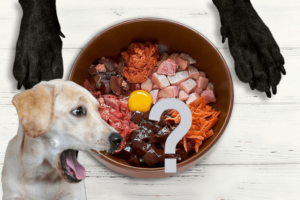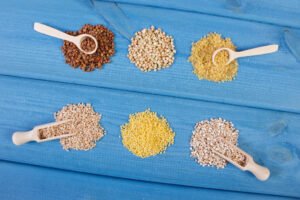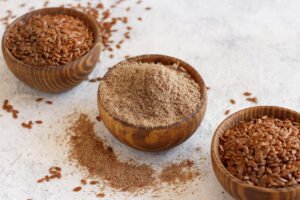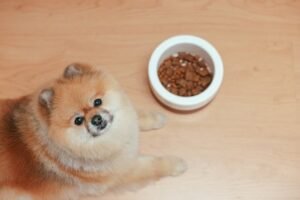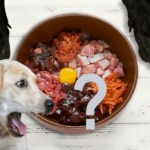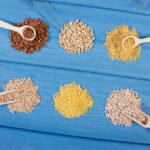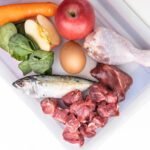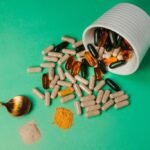The line between human foods and dog-safe treats is often blurred, leading to confusion and sometimes danger for our canine companions. While it’s tempting to share our meals with our dogs, it’s crucial to debunk the myths surrounding human foods and understand which items can safely make their way into a dog’s diet. This exploration isn’t just about caution; it’s about discovering nutritious, dog-friendly options that can enrich our pets’ meals with variety and essential nutrients.
Safe Human Foods for Dogs
Many human foods can safely be enjoyed by dogs, offering them both a taste of our world and a boost in nutrition. Here’s a curated list of safe and healthy choices:
- Carrots: Low in calories and high in fiber and vitamins, carrots are a crunchy, satisfying treat. They can also help with dental health by gently scraping teeth clean.
- Apples: A good source of vitamins A and C, apples (minus the seeds and core) can be a refreshing, low-calorie snack. They’re also high in fiber, which can benefit digestion.
- Lean Meats: Cooked, lean meats like chicken, turkey, and beef are excellent protein sources for dogs. Ensure they’re free from seasonings, sauces, and cooked bones.
- Pumpkin: Pure, unsweetened pumpkin is a fiber-rich food that can help with digestive regularity. It’s also a good source of vitamin A and antioxidants.
- Blueberries: Known for their antioxidant properties, blueberries are a superfood for dogs just as they are for humans. They’re also a sweet, low-calorie treat.
- Green Beans: Fresh, canned (in water, without salt), or frozen green beans are full of important vitamins and minerals, and they’re also low in calories, making them a great snack or meal topper.
- Bananas: In moderation, bananas are a great low-calorie treat for dogs, packed with potassium, vitamins, and fiber.
- Cooked Eggs: A wonderful source of protein and contain essential amino acids and fatty acids. Ensure they’re fully cooked to avoid the risk of salmonella.
- Oatmeal: A good source of soluble fiber, it’s particularly beneficial for older dogs with bowel irregularity issues. Make sure it’s cooked and served plain.
- Cucumbers: Excellent for overweight dogs, as they’re low in calories, fats, and oils, and can boost energy levels.
- Peanut Butter: Unsalted and unsweetened (xylitol-free) peanut butter is a favorite treat of many dogs and provides protein, healthy fats, niacin, vitamin B, and vitamin E.
- Rice: Plain, cooked brown or white rice is a good option for a dog with an upset stomach, offering easy-to-digest carbohydrates.
Foods to Avoid
While many human foods are safe, there are several that can pose serious health risks to dogs. Awareness and avoidance of the following items can prevent potential emergencies:
- Chocolate: Contains theobromine and caffeine, which can be toxic to dogs, even in small amounts.
- Grapes and Raisins: Can cause kidney failure in dogs; even a small amount is dangerous.
- Onions and Garlic: Can lead to oxidative damage to red blood cells and anemia.
- Xylitol: A sugar substitute found in many sugar-free products, xylitol can cause insulin release in dogs, leading to liver failure.
- Avocado: Contains persin, which can cause vomiting and diarrhea in dogs.
- Alcohol and Caffeine: Can be very dangerous, causing various adverse effects including nervous system depression, poor breathing, lethargy, and in severe cases, death.
- Macadamia Nuts: Can cause weakness, vomiting, hyperthermia, and tremors in dogs.
- Yeast Dough: Can rise and cause gas to accumulate in your dog’s digestive system, causing pain and potentially causing their intestines or stomach to rupture.
- Fatty and Spicy Foods: Can lead to pancreatitis and gastrointestinal upset.
- Corn on the Cob: While corn is safe, the cob can cause a blockage in a dog’s intestines.
- Cherries: Apart from the flesh, every part of the cherry can be toxic to dogs, potentially leading to respiratory failure and death.
- Dairy Products: Many dogs are lactose intolerant, and dairy can cause digestive problems and diarrhea.
Incorporating Human Foods into Your Dog’s Diet: Best Practices
Incorporating human foods into your dog’s diet can be done safely and beneficially with the following practices:
- Moderation is Key: Even safe foods should be given in moderation to avoid gastrointestinal upset and nutritional imbalances.
- Consult with Your Vet: Before introducing new foods to your dog’s diet, especially if they have existing health issues, consult with your veterinarian.
- Prepare Appropriately: Ensure all foods are prepared in a dog-safe manner, meaning they’re clean, properly cooked (when necessary), and free of harmful seasonings or additives.
Embracing Variety with Caution
Offering your dog a variety of human foods can enhance their diet, introducing them to a world of flavors and textures while providing essential nutrients. However, it’s a journey that must be undertaken with knowledge and caution. By understanding which foods are safe and which to avoid, and by consulting with veterinary professionals, we can ensure our canine friends enjoy the benefits of human foods without the risks, strengthening the bond we share through the joy of shared meals.




